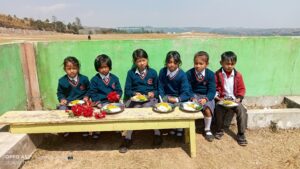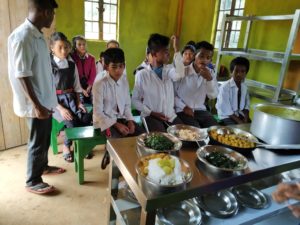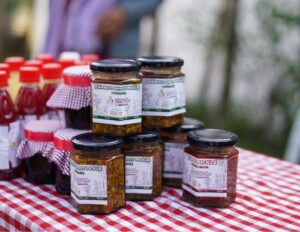Malnutrition is a silent condition that plagues millions of children worldwide. Deficiencies in nutrients and lack of a balanced diet lead to many infants suffering from conditions such as stunting, wasting, underweight, and micronutrient deficiencies.
The state of Meghalaya is no stranger to problems of malnutrition- specifically undernutrition. Among the North Eastern States, Meghalaya has the highest rates of stunting, reaching a significant 46.5%, according to the National Family Health Survey of 2022. The irony of all this lies in the fact that Meghalaya falls in the Indo-Burma Biodiversity hotspot which is home to a plethora of nutritious herbs, fruits, and vegetables.
Getting to the root of the problem through scientific mapping suggested that the necessity of micronutrients were available abundantly; only, the communities weren’t aware of how and what to eat to meet their daily dietary needs.
As such, in a bid to curb such issues and to improve the daily dietary intake of children, NESFAS with its own resources and community contribution initiated a school meals programme in mid-2022. The project was aimed to increase the access of school children to healthy, nutritious, and diverse balanced diets through school meals. The pilot project called “Linking Schools to Agrobiodiversity for Improved diets, Nutrition, and Livelihoods” was first launched in five schools in Meghalaya.
The project was brought about to broaden and diversify food resource base through the identification and promotion of locally available wild edibles and vegetables that are rich in micronutrients and highly resilient to climate change. It also aimed at improving access and affordability of nutritionally rich local food resources through domestication of micro-nutrient rich and climate resilient wild food resources in school and home gardens.
Through this project, NESFAS has helped set up a number of school gardens in the project villages. These school gardens encourage children to grow and maintain various food crops over various seasons helping them get a firsthand knowledge of Indigenous Food Systems.
In order to change the mindset and eating habits of children, teachers, cooks, and parents, cooking workshops and nutrition awareness on the 10 food groups by FAO required for meeting the daily dietary requirements are conducted regularly in schools. Along with this, the inclusion of wild edible plants and locally procured vegetables as part of the mid-day meals are actively encouraged.
The importance of it has also been highlighted by Miss Phiba Tariang, Headmistress of the Government LP School at Dewlieh. She shared that a school exists not only to provide wisdom to its students but also stands to ensure a better and a stronger future for the nation. “This starts by strengthening the health of the students by encouraging and educating children about the importance of consuming wild edibles and practicing a healthy food habit,” she commented.
As well as the teachers, parents of the students have also been actively engaged in the school meals project through various initiatives. A standout example is the Subakalai SSA School in Laitsohpliah where parents contribute vegetables for the school meals twice every week. Some of the parents help in the school garden by tending to the garden while also contributing seeds and manure.
Fundraising activities such as school meal fetes have also been conducted by both parents and teachers where the funds raised are put back into procuring high quality local produce and groceries for the school meal for the upcoming months or even years.
“The School meals project has taught us how to protect/ preserve Mother Nature which in turn provides us with healthy and nutritious food,” shared Bah Nestar Kharmawphlang, Headmaster of Laitsohpliah RCLP/RCUP School.
So far, with the support of The Indigenous Partnership (TIP) the school meals project has been implemented in 11 schools across Meghalaya reaching 404 students. In these 11 schools, 12 cooks have been trained by chefs on the importance of menu plans and diversity to meet the daily dietary requirements.
NESFAS has also come out with a document on local procurement guidelines which are now being implemented across the 11 project schools. To improve the system, feedback and monitoring systems are currently being developed in consultation with the communities.
The project also involved a baseline and endline assessment. The baseline reflected quite a high number of marginally inadequate diets (around 60%) that children were taking in terms of energy, protein intake and also the iron intake. The endline showed a significant improvement. Notably, iron content among school children increased by 10% between baseline and endline, highlighting the positive impact of wild edibles, which students readily consumed at school and home. With additional research on the nutritional analysis of wild edibles, one could argue for adequate consumption of micronutrients among school children.
Although the main target of the project is the schools, the communities developed the “community led plan” that seeks to prolong the sustainability of the programme by getting the communities more involved. This has led to community based initiatives such as firewood collection/donation, fundraisers, midday meal cooks from the local communities and the involvement of ALC members.
“Going forward, it is NESFAS’ hope that the school meals project will bring about modification in the Government Mid Day Meal programme so that it will cater to the dietary needs and the demands of the indigenous communities”, shared Bah Pius Ranee, Executive Director, NESFAS
Drawing lessons from the pilot, with the support of IPAF of the UN-IFAD, NESFAS has scaled up this model to 5 more schools in its latest project “Demonstrate successful community-based initiatives and innovate to create healthy and sustainable food systems to conserve/manage biodiversity, build climate resilience, improve nutrition and local livelihoods”




